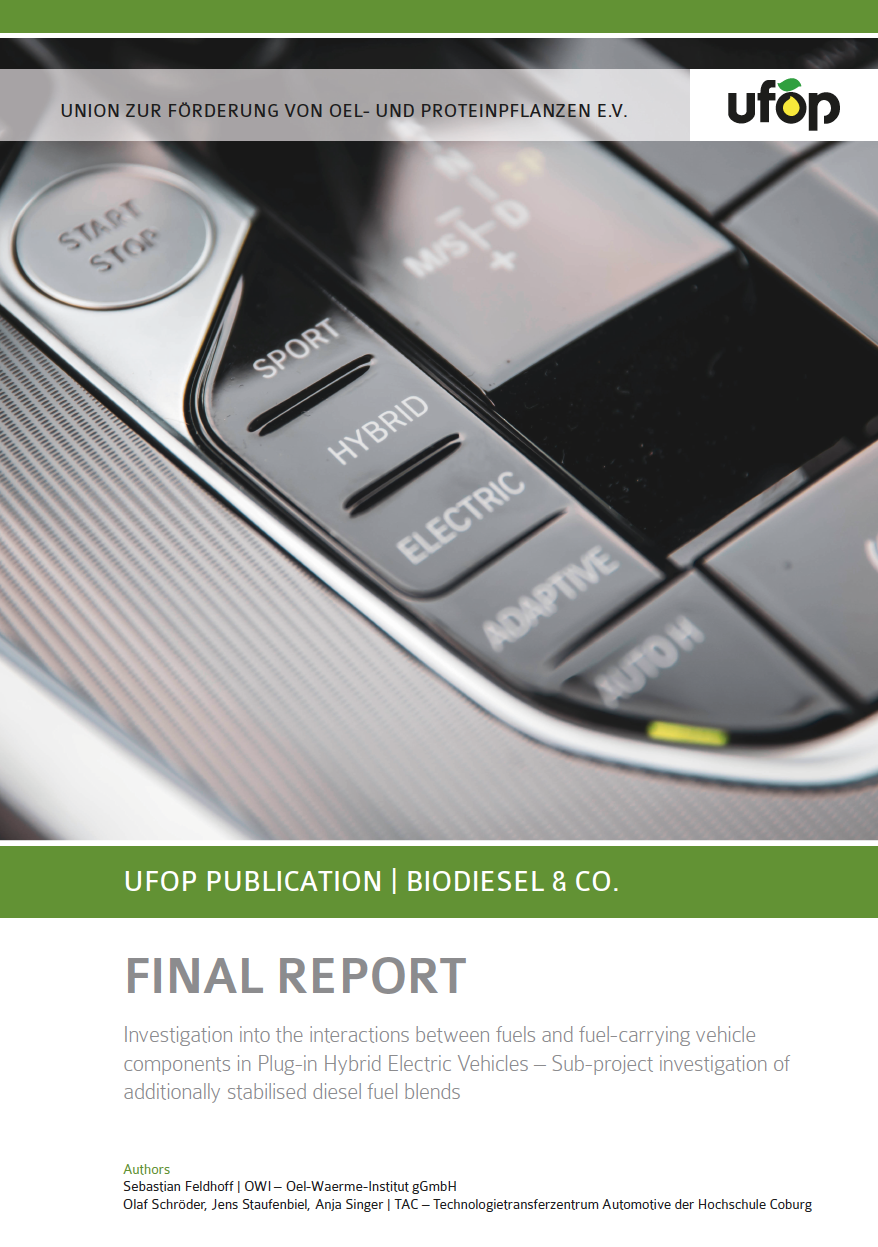Storage capacity of diesel fuel with 10% biodiesel (FAME)
Additive stabilises fuel mixture in vehicle tank
Berlin, 05. Oktober 2020. When up to 10% fatty acid methyl ester (FAME) is added to diesel fuel, operational reliability is maintained even if the fuel is stored in the vehicle tank for a period of 9 months. This requires a suitable additive to stabilise the fuel mixture.
This is the primary result of the investigations into the ageing behaviour of fuels in vehicle tanks over relatively long storage times, in near-application conditions. They were part of the research project "Fuels for PHEV vehicles" (Plug-in Hybrid Electric Vehicles, PHEV), which investigated interactions between fuels and their chemical components and fuel-carrying vehicle components.  The researchers determined that the blending of rapeseed methyl ester (RME) and rapeseed methyl ester/soy bean methyl ester (RME/SME) mixtures with mineral oil-based diesel fuel to the order of 10% (v/v) is technically possible. Currently, the fuel standard DIN EN 590 only permits blends of up to 7% (v/v). In order to stabilise these fuel blends over a longer period of up to 9 months, an additive was included, the effectiveness of which was verified by regular fuel analytical tests in the laboratory. The additive stabilised the fuel mixture over the entire period, which should ensure the safe operation of vehicles. However, engine tests were not included in the investigation. For future applications, the additives may have to be adapted to the type of FAME (fatty-acid-composition) used. A further result of the investigations is that the ageing behaviour of the fuel blends is also based on interactions between the mineral oil-based fuels and the different FAME, and cannot be attributed solely to the ageing properties of the FAME quality.
The researchers determined that the blending of rapeseed methyl ester (RME) and rapeseed methyl ester/soy bean methyl ester (RME/SME) mixtures with mineral oil-based diesel fuel to the order of 10% (v/v) is technically possible. Currently, the fuel standard DIN EN 590 only permits blends of up to 7% (v/v). In order to stabilise these fuel blends over a longer period of up to 9 months, an additive was included, the effectiveness of which was verified by regular fuel analytical tests in the laboratory. The additive stabilised the fuel mixture over the entire period, which should ensure the safe operation of vehicles. However, engine tests were not included in the investigation. For future applications, the additives may have to be adapted to the type of FAME (fatty-acid-composition) used. A further result of the investigations is that the ageing behaviour of the fuel blends is also based on interactions between the mineral oil-based fuels and the different FAME, and cannot be attributed solely to the ageing properties of the FAME quality.
The background of the investigation was that PHEVs can be expected to have significantly longer fuel dwell times in the vehicle tank while assuming predominantly electric operation. While the fuel in diesel vehicles is designed for a dwell time of about 90 days, dwell times of several months (6 to 9) can be expected in PHEV vehicles depending on driving behaviour. With this background, the research group recommends further investigations to optimise the long-term effectiveness between the FAME type or composition and the additive, with the aim of ensuring year-round operational safety.
The studies were financially supported by Forschungsvereinigung Verbrennungskraftmaschinen e.V. (FVV, Research Association for Combustion Engines), Deutschen Wissenschaftlichen Gesellschaft für Erdöl, Erdgas und Kohle e.V. (DGMK, German Society for Petroleum and Coal Science and Technology) and the Union zur Förderung von Oel- und Proteinpflanzen e.V. (UFOP, Union for the Promotion of Oil and Protein Plants).
The study is available as a free download:
Final Report: Investigation into the interactions between fuels and fuel-carrying vehicle components in PHEV (3,5 MB, pdf)


 Union zur Förderung von Oel- und Proteinpflanzen E.V.
Union zur Förderung von Oel- und Proteinpflanzen E.V.